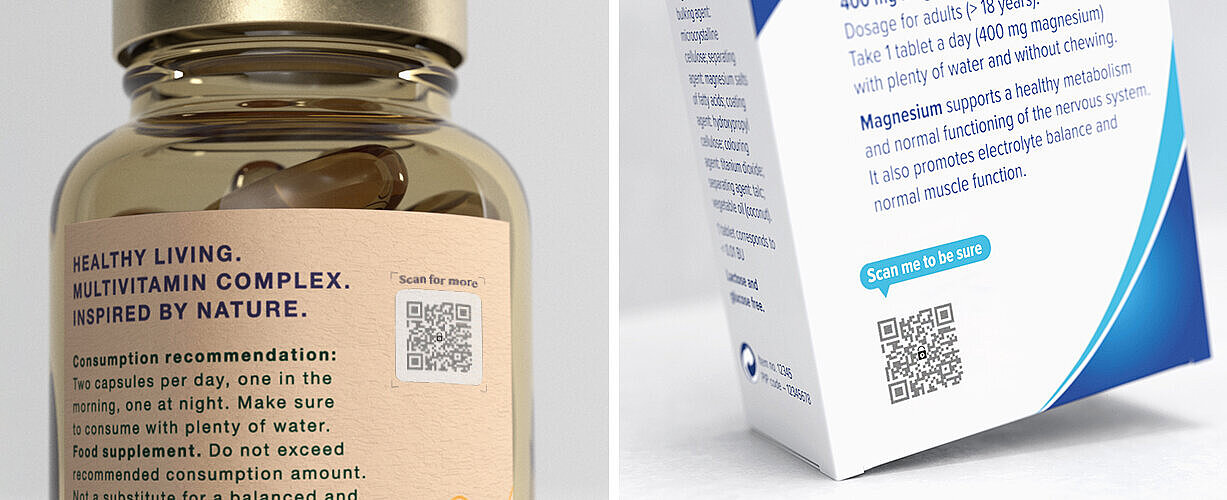The Problem with Counterfeit Supplements and What Brands Can Do about It

Counterfeit supplements pose a significant threat to consumer health and safety, infiltrating the market with deceptive products that not only fail to deliver promised benefits but also introduce potential dangers. This situation has become challenging for supplements brands, as they have to find ways to stop the distribution of counterfeit versions of their products, as well as win back consumer’s trust that they are purchasing legitimate supplements containing safe, quality ingredients. In the article, we cover the problems and risks associated with counterfeit supplements and what brands can do to combat this issue.
What is the difference between pharmaceuticals and supplements?
Firstly, it is important to stress the difference between pharmaceuticals and supplements, as they sometimes are put in the same category, but actually serve different functions and underly completely different regulations. Pharmaceuticals and supplements are distinct categories of products that serve different purposes and undergo different regulatory processes. Here are the key differences:
Purpose and Function:
Pharmaceuticals are drugs developed to diagnose, treat, prevent, or cure medical conditions. Pharmaceuticals typically undergo extensive research and clinical trials to prove their efficacy and safety for specific health conditions. They are often prescribed by healthcare professionals. Supplements, on the other hand, are intended to complement the diet and provide essential nutrients such as vitamins, minerals, amino acids, or herbal extracts. They are not designed to treat or cure diseases but are used to support overall health and well-being. The majority of supplements, like those containing protein, are utilized to bolster muscle mass in sports.
Ingredients:
Pharmaceuticals contain specific active ingredients at precise concentrations. The formulation is designed to have a targeted and measurable effect on the body, addressing specific medical conditions. Supplements contain a variety of ingredients in different dosages, such as vitamins, minerals, herbs, or other dietary substances. They are intended to supplement the diet and provide nutritional support rather than delivering therapeutic effects like pharmaceuticals.
Medical Supervision:
Pharmaceuticals are typically prescribed by healthcare professionals based on a patient's medical condition, and their use is closely monitored. Dosages and administration are carefully regulated to achieve the desired therapeutic effect while minimizing adverse effects. Generally, supplements are available over-the-counter or online, and individuals can purchase them without a prescription. They are often self-administered, and the responsibility for proper use lies with the consumer.
Regulatory Oversight:
The development, production, and sale of pharmaceuticals are highly regulated by health authorities such as the U.S. Food and Drug Administration (FDA) in the United States or the European Medicines Agency (EMA) in Europe. Strict protocols, including clinical trials, are required to demonstrate safety and efficacy before a pharmaceutical product can be approved for market distribution.
Supplements are regulated differently and are considered as food products in many countries. While they must adhere to certain quality and safety standards, the regulatory process for supplements is generally less stringent than that for pharmaceuticals. The responsibility for ensuring the safety and efficacy of supplements often falls on the manufacturers.
Therefore, supplements can be sold without getting approval from the FDA or the EMA, as long as they don't have a controlled substance or drug. In turn, supplement buyers have to trust that the product works as the manufacturer claims.
This lack of regulatory oversight presents a unique opportunity for counterfeiters and criminals, as it is quite easy to counterfeit and distribute these high-value products. In 2023, the global supplement industry was estimated to be worth a whopping $167.5 billion. Famous people or powerful advertising can make certain products even more popular. Counterfeiters then distribute fake versions of these popular products en masse – contents unknown.
The problems and risks of fake supplements
Not knowing the contents of the supplements you are consuming, can not only fail to deliver promised benefits but also introduce potential dangers. In the following , we will list the problems and risks associated with counterfeit supplements:
Consumers invest in supplements with the expectation of improving their health and well-being. Counterfeit products, however, often lack the active ingredients necessary to provide the desired benefits. Therefore, consumers not only jeopardize their health but also waste their money on products that fall short of delivering the promised results.
However, these products can also pose serious risks. Counterfeiters frequently manipulate labels to deceive consumers about the nutritional content of their products. Inaccurate ingredient lists can lead to unintended allergic reactions, complications with existing medical conditions, or deficiencies in vital nutrients. Counterfeit supplements may also be contaminated with impurities, including toxins, heavy metals, or other harmful substances. Therefore, counterfeit supplements put consumers at risk of adverse reactions and long-term health issues.
Also looking at the big picture, the production and distribution of counterfeit supplements contribute to illegal and unethical practices within the health and wellness industry. By purchasing counterfeit products, consumers inadvertently support a shadow economy that undermines the efforts of legitimate manufacturers and jeopardizes the integrity of the entire market.
An example is the case of Fungi Perfecti, the entity behind the industry-leading brand Host Defense® Mushrooms, who unearthed multiple unauthorized sellers distributing counterfeit products under their name. These not only displayed irregularities in packaging, but even more alarmingly, tested positive for known allergens like soy and gluten, starkly departing from the authentic gluten-free and soy-free formulations of genuine Host Defense products.
The distribution of fake supplements
Fungi Perfecti tracked down these unauthorized sellers on Amazon, which serves as a good example for the reason so many fake supplements are in circulation: online marketplaces.
The surge in online shopping has revolutionized the way consumers access health products, but it has also given rise to a concerning issue – the prevalence of counterfeit supplements on popular platforms like Amazon. Amazon's vast marketplace includes numerous third-party sellers, making it challenging for consumers to differentiate between legitimate and counterfeit supplement providers. The lack of a foolproof system to verify sellers can lead to inadvertent purchases of substandard or fake products.
In November 2023, for example, a lawsuit was filed against several individuals accused of selling counterfeit Prevagen on Amazon. The NOW Foods team uncovered 11 different counterfeit NOW supplements, including psyllium husk capsules, magnesium citrate, and a men's multivitamin, all sold on Amazon by a single seller.
In 2019, Amazon itself warned some of its customers per E-mail that they may have purchased counterfeit Align probiotics. Align is a Procter & Gamble product, and Amazon decided to stop any third-party sellers from listing the product at that time. A Procter & Gamble spokesperson assured customers, that Amazon would only sell Align products that they had received directly from P&G manufacturing facilities.
The good news is that Amazon continues to be involved in fighting counterfeits on its platform with initiatives like Project Zero, Amazon Transparency Codes and the new Counterfeit Crimes Unit. We are also delighted to inform you that all KURZ SCRIBOS solutions can act as Amazon Transparency Codes, as Amazon is currently preparing to open up their policy and will soon allow other unique codes to be uploaded to the Transparency database.
However, it has to be noted, that brands need to elect to participate in these Amazon programs and there is no official list where consumers can check which brands are participating. Also, even if the counterfeit Align pills sold on Amazon turn out to be harmful, buyers would likely have little legal recourse against the company.
Therefore, consumers have to be very careful when buying on online marketplaces.
ConsumerLab gives some good advice on how to best avoid counterfeits on Amazon. They also give a comprehensive list of supplement brands and how they sell their products online.
It becomes apparent that it is not an easy task to identify counterfeit supplements. Sticking with legitimate sellers is the best course of action, but even reputable retailers like GNC and Walgreens have been caught selling fake goods. That's why supplement brands need to keep a close eye on their supply chain and invest in effective anti-counterfeiting solutions, that can easily be spotted and authenticated by their customers.
As a side note: If brands are wary to invest in Amazon Transparency Codes, as they don't know how many of their products will actually be sold on the platform, it would be better to invest in an anti-counterfeiting solution that works independently and can also be used as an Amazon Transparency Code. This double approach ensures that all their products are safeguarded from the outset, making the investment more worthwhile.
How can brands combat counterfeit supplements?
We have many effective solutions for you to combat your supplement products from being counterfeited. We offer security labels, as well as security sealing. Another very secure and cost-effective solution is our ValiGate® Direct Print solution, which can be printed directly onto the packaging or label either at the packaging manufacturer or directly in the production line. As a sustainable and highly scalable anti-counterfeit marking, it is particularly suitable for high-turnover products like supplements.
If you have an HP Indigo or working together with a print-shop that prints on HP Indigo, you can print our ValiGate® Direct Print directly together with your product label or packaging. It can be customized completely to your wishes.
To authenticate the product, the user only has to open the camera and scan the encrypted QR code of our ValiGate®. The scan triggers a fully automated authentication process, which is accessible without an app. This enables all users to check if they have purchased an original version of your product.
As the ValiGate® Direct Print solution links the product to our SCRIBOS 360 digital platform, you can also offer your customers digital extras such as ingredient lists or coupons.
With KURZ SCRIBOS solutions, you can therefore protect your supplements from any illegal activity, while offering your customers a fresh experience with your brand!




